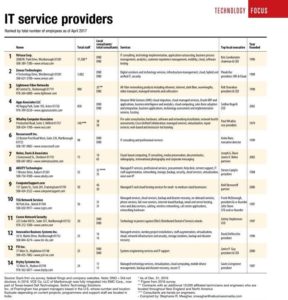Bryley Systems Inc. Ranked Among Top 501 Global Managed IT Service Providers by Channel Futures
MSP 501 Identifies World’s Most Forward-Thinking MSPs & Leading Trends in Managed IT Services
July 9, 2018: Bryley Systems ranks among the world’s 501 most strategic and innovative managed IT service providers (MSPs), according to Channel Futures MSP 501 Worldwide Company Rankings.
The MSP 501 is the first, largest and most comprehensive ranking of managed IT service providers worldwide. This year Channel Futures received a record number of submissions. Applications poured in from Europe, Asia, South America and beyond.
As it has for the last three years, Channel Futures teamed with Clarity Channel Advisors to evaluate these progressive and forward-leaning companies. MSPs were ranked according to our unique methodology, which recognizes that not all revenue streams are created equal. We weighted revenue figures according to how well the applicant’s business strategy anticipates trends in the fast-evolving channel ecosystem.
“We are honored to be named a winner of the MSP 501 for the fifth consecutive year.” said Gavin Livingstone, President and CEO, Bryley Systems. “It is a great honor and demonstrates our dedication to remain one of the top providers of managed IT services worldwide. We look forward to continuing to provide excellent service to our clients.”
Channel Futures is pleased to honor Bryley Systems.
“This year’s applicant pool was the largest and most diverse in the history of the survey, and our winners represent the health and progressivity of the managed IT services market,” says Kris Blackmon, Channel Futures content director and editor of the MSP 501. “They’re growing their revenue, expanding their customer influence and exploring new technology that will propel them for years to come.”
The full MSP 501 report, available this fall, will leverage applicant responses, interviews and historical data to identify business and technology trends in the IT channel. Highlights will include:
- Revenue growth and business models
- Hiring trends and workforce dynamics
- Business strategies
- Service deliverables
- Business tools and automation investments
Background
The 2018 MSP 501 list is based on data collected by Channel Futures and its sister site, Channel Partners. Data was collected online from Feb. 28 through May 31, 2018. The MSP 501 list recognizes top managed IT service providers based on metrics including recurring revenue, growth and other factors.
About Bryley Systems
Bryley Systems proactively manages, optimizes, and secures the IT infrastructure of organizations in manufacturing, business services, passenger transit, and local government. From Cloud-based to on premise solutions, they approach each client’s needs individually, with flexible service options and custom-fit agreements. Since 1987, Bryley Systems has been providing Dependable IT at a Predictable Cost™ to clients throughout the continental United States.
About Informa
Channel Futures, Channel Partners Online, Channel Partners Conference & Expo and Channel Partners Evolution are part of Informa, the international business intelligence, academic publishing, knowledge and events group. Informa serves commercial, professional and academic communities, helping them connect and learn, and creating and providing access to content and intelligence that helps people and businesses work smarter and make better decisions faster.
Informa has over 10,000 colleagues in more than 20 countries and a presence in all major geographies. It is listed on the London Stock Exchange and is a member of the FTSE 100.
Learn more on how Managed IT Services can help your business.
Discover the best IT Company suited for your business.












